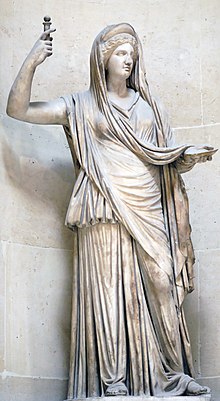

ORIGIN: Greek
TYPE: The Wife of Zeus
KNOWN PERIOD OF WORSHIP: Circa 800 BCE in Greece but probably earlier, until Christianization (circa CE 400).
CENTER(S) OF CULT: Plataea (Boeotia) and others.
ART REFERENCES: Sculptures and carvings
LITERARY SOURCES: Iliad (Homer); Theogony (Hesiod).
INFORMATION: As the long-suffering, but also jealous and quarrelsome fire of the philandering and all-powerful god Zeus, Hera adopts a position in the Greek pantheon that is at times ambiguous. The relationship with Zeus is incestuous since she is also the eldest daughter of Kronos and therefore Zeus's full sister. Mythology views her both as an independent adn wilful senior goddess, and as a tragi-comic figure. Her marriage involves a degree of subterfuge, persuading Zeus by means of a magic girdle momentarily to forget his preoccupation with the Trojan War. In another piece of legend Zeus turns himself into a cuckoo so that he may fly into Hera's bosom. Who seduced whom thus remains ambiguous. Curiously, neither in literature nor in art is Hera perceived as a mother goddess. She seems to have borne only a limited number of Zeus's named children. The most prominent is Ares, yet he is also the least favored by the god. Other minor offspring included Hebe adn Eileithyia. Hera relates to Zeus in three distinct "phases"—consummation in which she is pais the girl; wedding and fulfillment as teleia; and separation when she becomes chera.
As stepmother to Zeus's illegitimate children, Hera displays a jealous and malicious character, directing her anger at Herakles and Dionysos in particular. In a fire festival practiced in Boeotia to the "great Daedala", wooden images were burned to enact a legend whereby Plataea, one of Zeus's concubines, was stripped naked, humiliated, and immolated by a jealous Hera.
During a New Year festival, the Heraia, ro honor Hera, her priestesses were carried to the sanctuary on a cart drawn by oxen which also presumably contained a statue of the Goddess. Traditionally a women's games festival dedicated to Hera was also held on Olympus every four years.